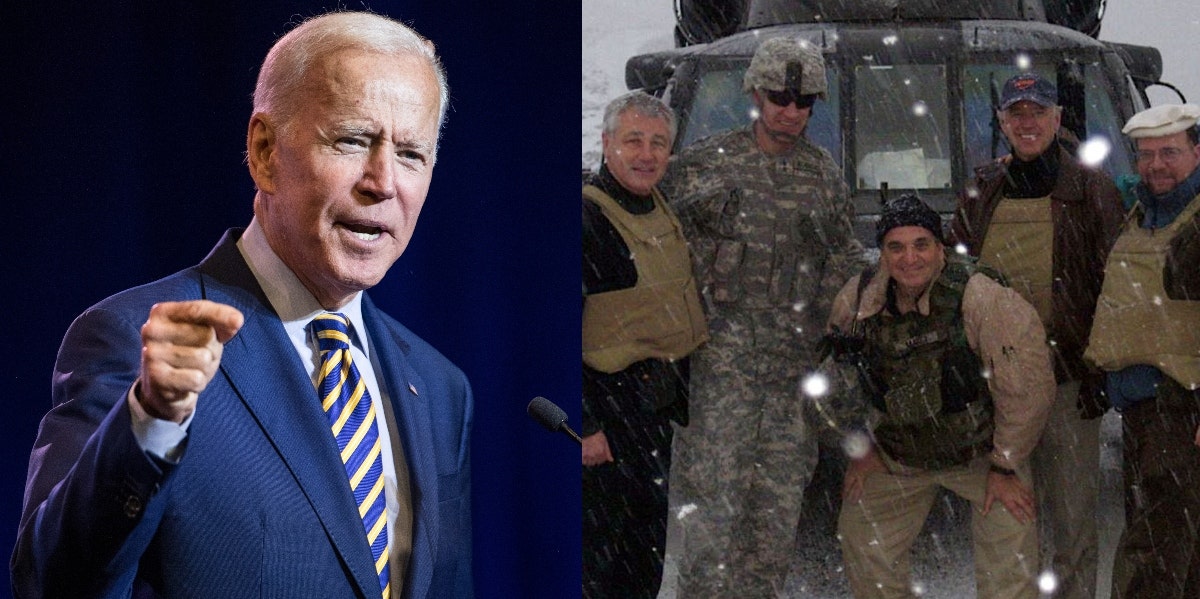Interpreter Who Helped Rescue Joe Biden In Afghanistan In 2008 Begs President For Help Fleeing Kabul
“I can’t leave my house. I’m very scared.”
 Naresh777 / Shutterstock / John Silson / Brian R Genthe /U.S. Department of State
Naresh777 / Shutterstock / John Silson / Brian R Genthe /U.S. Department of State In the winter of 2008, when Joe Biden was the chair of the Senate Foreign Relations Committee, he, John Kerry, and Chuck Hagel were on a congressional visit to Afghanistan.
When their helicopter got lost and needed to do an emergency landing in Taliban territory, an emergency call was made to Bagram Airfield where U.S. Army and Blackwater soldiers were monitoring Taliban activities.
Mohammed was among those who jumped into a humvee and went to rescue the then congressmen.
The interpreter who rescued Joe Biden wants help escaping Afghanistan.
“Hello Mr. President: Save me and my family,” Mohammed, who asked not to use his full name while in hiding, told The Wall Street Journal, “Don’t forget me here.”
As the last of the American soldiers left Afghanistan a couple of days ago, the interpreter had been left behind due to complications with his visa application.
Mohammed has struggled to get a visa to leave Kabul.
Once the Taliban began taking over various parts of Afghanistan, Mohammed tried to get a visa for him and his family, but was delayed when the defense contractor he worked for lost the papers he needed in order to get it.
RELATED: Helping A Friend Escape The Taliban Was The Hardest Thing I've Ever Done
“His selfless service to our military men and women is just the kind of service I wish more Americans displayed,” Lt. Col. Andrew R. Till wrote in June to support Mohammed’s application for a Special Immigrant Visa.
"He had been in hundreds of firefights alongside the U.S. Army soldiers," said Brian Genthe, who served as a staff sergeant in the Arizona National Guard in 2008 and brought Mohammed along on the rescue mission.
Trapped in Afghanistan without a visa, Mohammed also tried to leave with the other refugees that were getting out via U.S. airships at the Kabul airport.
When U.S. soldiers told him that he could get in but his wife and kids couldn’t, he decided to stay with his family.
Now, Mohammed is stuck in hiding. “I can’t leave my house,” he said on Tuesday. “I’m very scared.”
Army veterans have tried to help Mohammed.
After hearing that he was trapped, army veterans who worked with Mohammed in the past jumped in to try and help him — making calls to various lawmakers and issued appeals with U.S. officials.
“If you can only help one Afghan, choose [Mohammed],” wrote Shawn O’Brien, an Army combat veteran who worked with him in Afghanistan in 2008. “He earned it.”
RELATED: Young Girls In Afghanistan Fear Becoming Victims Of The Taliban — Just Like Malala Yousafzai
The interpreter spent 30 hours in freezing temperatures protecting the helicopters that the congressmen flew in on while they were shuttled back to the airfield, awaiting orders to return to the air.
Whenever locals came too close, he used a blowhorn to scare the people away.
“We were going to send Biden out to fight the Taliban with snowballs, but we didn’t have to do it,” Mr. Kerry joked after they were rescued.
The White House have pledged to help the interpreter.
White House secretary Jen Psaki responded to Mohammed and thanked him for his service — reassuring everyone that the U.S. was still committed to getting Afghan allies out of the country.
“We will get you out,” Ms. Psaki said after a Wall Street Journal reporter read Mohammed’s message to the president. “We will honor your service.”
Mohammed, his wife, and their four children are one example of the many U.S. allies that were left behind after the U.S. ended its 20-year campaign in Afghanistan.
Isaac Serna-Diez is a writer who focuses on entertainment and news, social justice and politics.

